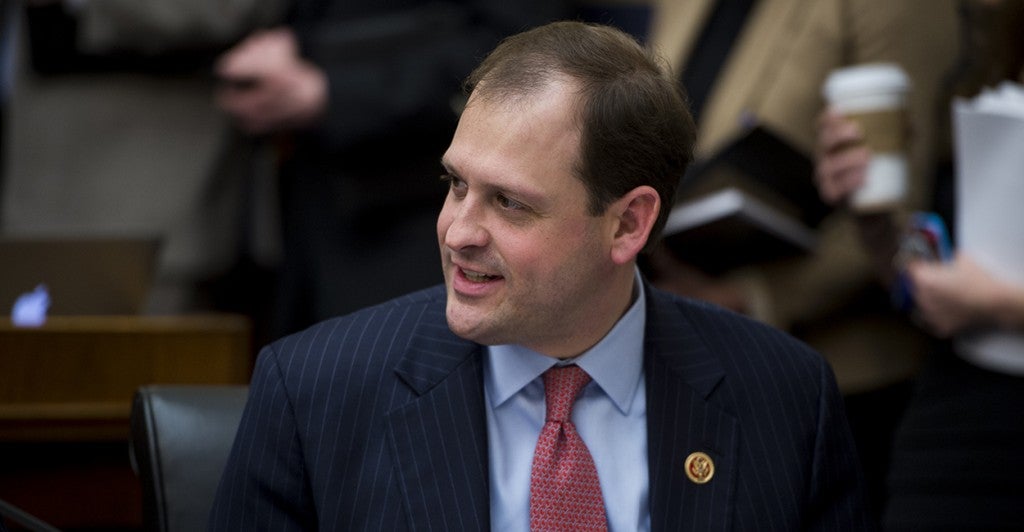Proponents of the Export-Import Bank tout the agency as a champion of small businesses, but Rep. Andy Barr, R-Ky., yesterday challenged that claim during a hearing and told the story of of a small Kentucky company that was overwhelmed by related regulations.
Ex-Im Bank, an 80-year-old agency that provides taxpayer-backed loans to foreign companies and countries to buy U.S. products, has been at the center of contentious debate on Capitol Hill in recent weeks. Its charter expires Sept.30, and unless Congress acts, the bank will be closed to new business.
Fred Hochberg, Ex-Im’s chairman, praised his institution for being a key partner for small businesses in his testimony before the House Financial Services Committee. “We’re there when the private sector can’t or won’t,” Hochberg told lawmakers.
According to the agency’s 2013 annual report, “nearly 90 percent of Ex-Im’s transitions directly benefited small businesses.” Those firms, though, receive less than 20 percent of financing.
During the hearing, Barr cited a small business in his district, Kentucky’s sixth, that stopped working with Ex-Im because of its time-consuming, expensive, and burdensome regulations.
‘No Difference in Sales’
LectroDryer, a manufacturer of liquid dryers, partnered with the bank for several years, according to agency records. The company benefited from $5.6 million in funds from Ex-Im from 2007 to 2013, and the agency said it supported $15.6 million in export sales during that time frame.
LectroDryer’s chief executive officer, John McPhearson, spoke with Barr’s office Tuesday about his company’s experience in working with Ex-Im. According to Barr, McPhearson said:
We reached the point where someone was working full time to make sure the reporting documents were filled out so we could continue to receive our line of credit. You simply can’t take a company of only 70 employees and dedicate one entirely to filling out this kind of paperwork. If the Export-Import Bank went away, it wouldn’t make a difference to me. … We have seen no difference in sales since we stopped working with Ex-Im Bank. The reason we stopped working with Ex-Im Bank was the cost and the complexity.
Since 2001, LectroDryer has grown tremendously and expanded its business twice, according to local news reports. The company exports products to Tunisia, Saudi Arabia, United Arab Emirates and South Korea, among others.
Barr told fellow lawmakers Hochberg suggested his office reach out to the company as proof that Ex-Im helps companies grow from small businesses to international brands.
‘Hope to Get It Right’
After hearing Barr’s description of LectroDryer’s experience, Hochberg said:
We’re asked by this committee to do a better job of risk management, a better job of oversight, so I’m trying to find a balance between supporting jobs and doing the job of oversight. I hope to get it right.
In addition to Barr, Republican lawmakers yesterday spoke out against Hochberg’s contention that Ex-Im is a major supporter of small businesses nationwide.
“So who benefits? Overwhelmingly — and indisputably — it’s some of the largest, most politically connected corporations in the world, like Boeing, General Electric, Bechtel and Caterpillar,” said Financial Services Chairman Jeb Hensarling, R-Texas, who also pointed out more than half of Ex-Im’s financing in 2013 went to “a handful of Fortune 500 companies.”
The bank follows the U.S. Small Business Administration’s guidelines in defining a “small business.” According to the SBA, a company in the manufacturing or wholesaling industries, which LectroDryer falls under, is considered a “small business” if it employs between 500 and 1,500 employees.
Pickle Promotion
Hochberg has been known to woo crowds with stories of small businesses that hinged on Ex-Im’s financial support. Diane Katz, a regulatory policy fellow at The Heritage Foundation, noted in a recent column the story of a company called Miss Jenny’s Pickles. Katz wrote:
Hochberg often regales audiences with the story of how business owner Jenny Fulton was so inspired by a 2011 presentation he gave in Charlotte, N.C., that she ran to her car to retrieve a jar of pickles, thrust it into the hands of Hochberg’s driver and instructed him make sure the bank president sampled some. So impressed was he with the product, evidently, that Ex-Im financing soon followed, and Miss Jenny’s Pickles became a global sensation.
But, according to Katz, Miss Jenny’s Pickles was a success long before Ex-Im’s intervention. Fulton and co-owner Ashlee Furr secured shelf space in more than 600 U.S. stores, including Harris-Teeter, Whole Foods and Williams Sonoma. QVC also sold its products. In 2011, Miss Jenny’s Pickles began exporting to 40 stores in China and had plans to expand to Mongolia and Canada.
The company, Katz said, first received $200,000 in credit insurance from the bank in 2013 and again in 2014. She concluded:
The bank’s tale about Miss Jenny’s Pickles makes for heart-tugging promotion. But Fulton and Furr, not Ex-Im, are the real architects of their success.
Committee’s Call?
Though lawmakers argue the merits of Ex-Im, Hensarling looks set on letting the agency’s charter expire without any action by his committee to save it.
Fellow conservatives feared House leadership would bypass the Financial Services Committee and bring legislation to the floor, but Speaker John Boehner, R-Ohio, and Majority Leader Eric Cantor, R-Va., said they would defer to Hensarling and his committee.
The Senate could act first in passing legislation extending Ex-Im’s charter.
